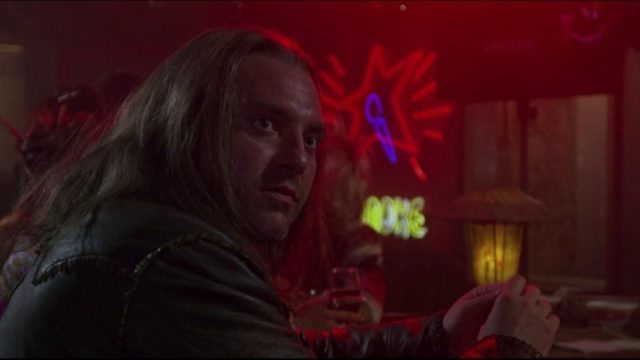After spending many years in the streaming wilderness, Kathryn Bigelow’s Strange Days has landed on HBO Max, and it’s well-worth your attention.
It’s hard to talk about science fiction noir without inviting comparisons to Blade Runner, but Strange Days legitimately feels very different, more like the love child of William Gibson and James Ellroy. A friend of mine pointed out the Ellroy comparison, and it’s extremely apt: a harsh political landscape with dark, outsized, and violent passions stalking about, with a certain doomy but redemptive romanticism. (Someone convince Bigelow to adapt The Black Dahlia.) The science fiction aspects are well-handled, from the central technological device–a memory-recording headset that quickly leads to a black market in clandestine, high-octane experiences–to the ten-seconds-from-now positioning of a world tipping towards fascism but still featuring New Year’s parties and Chinese restaurants and all the stuff of ordinary life. It’s convincing. But the film’s heart is with the noir side of the equation, with betrayal and lovesickness and sleaze.
Ralph Fiennes stars as Lenny, who–after a sharp comedown in life–now makes his living peddling memory recordings. He’s a good, smooth salesman, and he has some ethical lines, if they’re getting steadily more smudged. He also has an obsession with his ex, Faith (Juliette Lewis), who went from scantily clad but clean-cut to neon-washes and on the skids, and who is now involved with music industry bigshot Philo (Michael Wincott). When Lenny gets his hands on a harrowing memory recording of a friend of his–and of Faith’s–being raped and murdered, he starts looking into the case. He’s accompanied by his friends, private investigator Max (Tom Sizemore), and limousine driver and tough-as-nails bodyguard Mace (Angela Bassett).
As our own Persia has noted, Mace is a major highlight of the film. Bassett is magnetic in the role, giving a performance that practically burns through the celluloid. Mace is a moral force–maybe the only real moral force in the movie–and she has an intensity and clarity the other characters lack. Even when she’s ambivalent–as she is about her feelings for Lenny–her actions are precise and purposeful. While Strange Days is ultimately more optimistic about society than society really deserves–something that’s even clearer in 2023 than it was in 1995, when the movie was made–Mace’s willingness to burn it all down if necessary leaves a more lasting impression.
The film’s mishmash of the personal and the political is sometimes clumsy and too exculpating–but to be fair, its film noir influences are closer to the hardboiled end than the luckless, amoral loser end, and weak plotting in hardboiled detective stories is practically a tradition, one that dates back all the way to Raymond Chandler not knowing who killed the chauffeur in The Big Sleep. The atmosphere, the characters, the set-pieces, the emotional highs and lows, the alternately bleak and exultant visuals–all that works, and that’s all you need.

